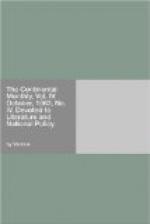The Executive of this, as of every country, resorts to this law when, in the nature of things, the statute law is inadequate. In doing this, he does not violate law; he only adopts another kind of law. A subtle, delicate law, indeed, which can neither be inscribed among the enactments, nor exactly defined, circumscribed, or expressed. When it is to be substituted for the ordinary modes of legal procedure, how far it is to be used, when its use must cease—these are questions which the people, as the sole final arbiters, must decide. As the individual in society must judge wisely when the community will sanction his use of the contingent law, the law of private military power, so to speak, in his own behalf; so must the Executive judge when the urgency of the national defence demands the exercise of the summary power in the place of more technical methods. If the public sentiment of the community sustain the individual, it is an indorsement that he acted justifiably in accordance with this exceptional law; if it do not, he is liable for an unwarranted usurpation of power. The Executive stands in the same relation to the nation. The Mohammedans relate that the road to heaven is two miles long, stretching over a fathomless abyss, the only pathway across which is narrower than a razor’s edge. Delicately balanced must be the body which goes over in safety! The intangible path which the Executive must walk to meet the people’s wishes on the one side, and to avoid their fears upon the other, in the national peril, is narrower than the Mahommedan’s road to heaven, and cautiously bold must be the feet that safely tread it! Blessed shall that man be who succeeds in crossing. The nations shall rise up and call him blessed, and succeeding generations shall praise him.
We come then to the relations of the press and the Executive. We have seen that all liberty is relative, and not absolute; that the people, the sovereigns in this country, have prescribed certain methods for securing, in ordinary periods, those blessings which it is their desire to enjoy; that when, under special contingencies, these methods become insufficient for this purpose, the people may, in virtue of their sovereignty,




